

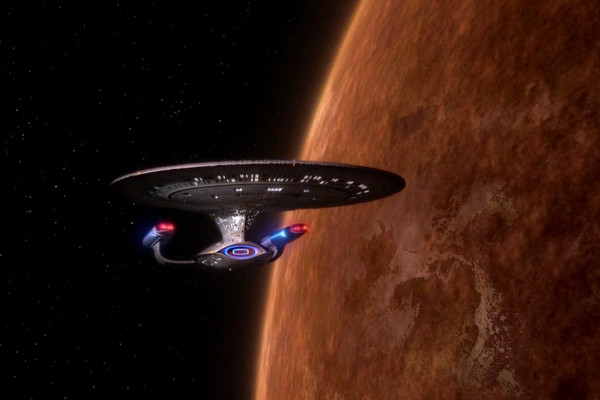
Season six of the series was where it hit its commercial peak, with an average of 12.53 million viewers Stateside. The entire season can be ordered online via Amazon. In the meantime, please join me as I rank the sixth season episodes, from worst to best...
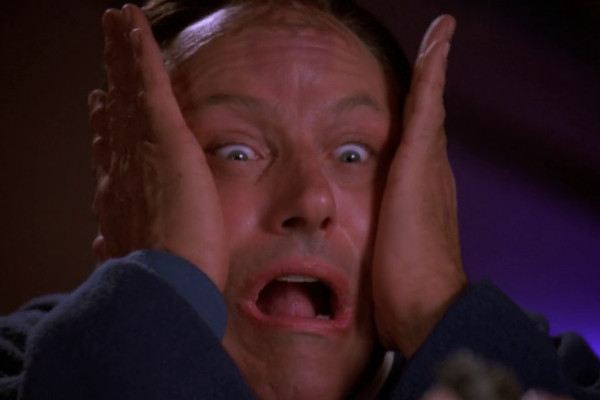
A major failing of The Next Generation, often cited, is that the crew all get along and care about one another, with no real conflict. Although having a beige spaceship where everyone cares about one another's feelings might be nice in real life, it doesn't particularly contribute to what a drama series needs, which is... drama. Consequently many episodes are forced to have one of the regulars act out of character in order to artificially generate some of that narrative conflict, but there's only so many times that your crew members can get possessed/mind controlled before it starts to stretch credulity. In just this season alone we have the following personnel acting out of character: Riker (Schisms, Frame of Mind), Worf (Rightful Heir), Data (Descent)... and, here, Deanna Troi.
A character that many fans love to hate, Deanna isn't that badly regarded here at The Anorak Zone, despite the fact that her contribution amounted to little more than saying "I am sensing hostility, Captain", when the Enterprise was being attacked, and developing a cockney accent without anybody noticing. But far more disturbing is the way she was treated in terms of her sexuality. The Next Generation was a very forward-thinking show for its time, a period where the perjorative of "political correctness" was beginning to enter modern life. Sadly, however, this didn't catch up to Troi, who spends the first five-and-a-half seasons in demeaning, cleavage-exposing outfits, and, worse, is impregnated without consent in the season two opener The Child. This nasty tone of what amounts to basic rape continues here, with Troi's mind overridden in a shabby Dorian Gray plot, and having sex with a random crewmember as a result. That no one consoles her over this or suggests that she, ironically, needs counselling, is a serious black mark against the programme. Still, at least it ends with Chip Lucia, as pictured, giving a subtle and nuanced performance as the villain.
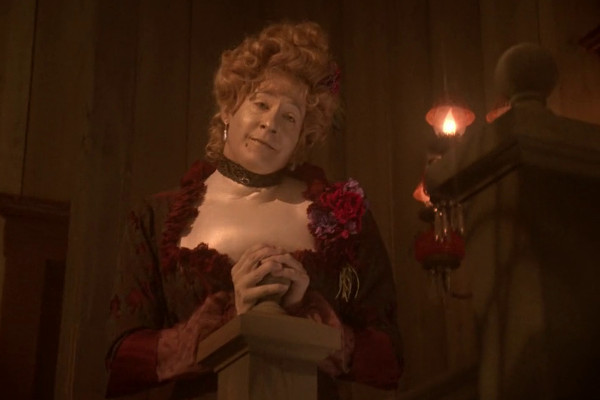
One fatal flaw of a lot of serious TV shows that do occasional "comedy" episodes is that all are encouraged to "play it big" and really "sell" the joke. Although all comedy is subjective, and this may be someone's idea of a laugh riot, pretty much all comedy in Star Trek is broad, overegged and playing to the lowest common denominator, from The Trouble With Tribbles all the way down to Brent Spiner shamelessly hamming it up in the weak first Next Generation movie Generations. Even Deep Space Nine, the Zone's favourite of the Star Trek series, had its direst moments when devoting an entire 45 minutes to the name of "humour".
A Fistful of Datas sees all concerned smugly indulging in overacting, "comedy" accents and arch double-takes, as Data becomes a villainous cowboy in a Holodeck program. The Holodeck wasn't always the rock bottom of the show - a story featuring it even appears far higher up this particular ranking - but was, generally, the laziest source of story material. This particular episode is an excruitating watch, with a small role for Patrick Stewart, the only member of the cast who could genuinely time a joke. However, Stewart isn't without blame here..... he was the one who directed it.
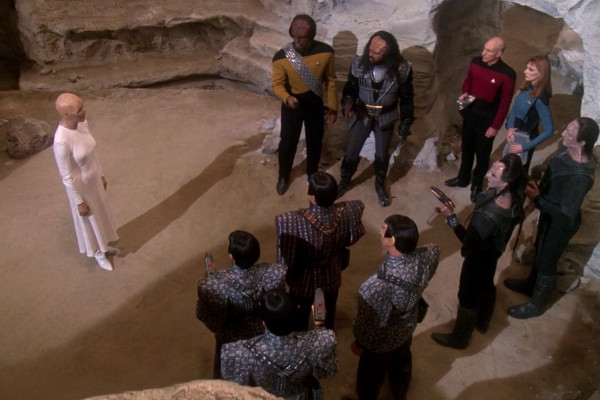
The worst reputation Star Trek has is for a preponderance of plots that have messages like "this human emotion called love" and other worthy, saccharine developments of the like. The Chase is just that, a farcical series of double-crossing and people taking turns to explain the plot to one another. The great Maurice Roëves is wasted in a bit part as a Cardassian leader, as all gathered stand around and listen to an alien projection delivering a two-minute monologue that explains that all the races are related to one another, coming from the same basic DNA. As they take leave of one another with renewed hope for the future, this information does, at least, explain why so many of Trek's aliens look like humans with cheap prosthetics glued onto their faces, and, crucially, why the Cardassians have what appears to be a clitoris on their foreheads.
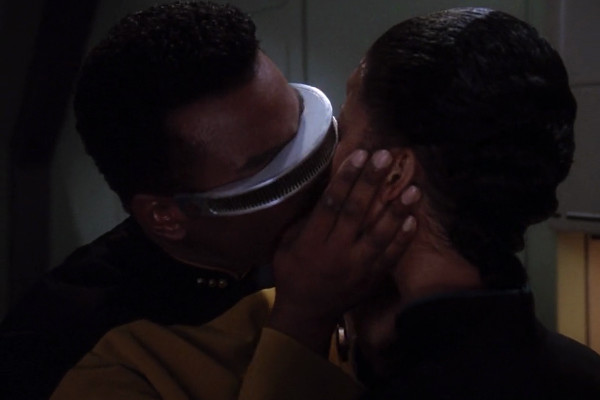
After six years on board the Enterprise, Geordi hasn't had any female interaction, and has had to rely on Data to relieve his tensions. Consequently, when a female crewmember of a space station turns up on the Enterprise, the blind engineer goes around acting like a randy tom cat. Even when Riker tries to take him in hand and ask him to calm things down, he risks dereliction of duty by getting personally involved, causing Riker to develop the ultimate c-block by blasting her with a phaser.
Part of the issue with so many Next Generation episodes is the format. While not every science fiction series benefits from a season arc - such as the "go anywhere in time and space" Doctor Who being mystifyingly retooled as an interconnected narrative - with the Next Generation we instinctively know that virtually no elements will reappear in future episodes. Ultimately a "Geordi has a romance" episode falls flat, because we know it won't go anywhere. It also doesn't help that TNG is such a sterile show that sex appeal and chemistry rarely, if ever, feature. As the story closes, the Aquiel of the title leaves, with Geordi having only her dog for company. However, not realising that her dog isn't quite what it seems (despite the fact that he hasn't fed it for about three days and it doesn't even bark for food), Geordi discovers that it's really a shape-changing alien that he has to zap with his phaser. Things never go right for poor old Geordi.
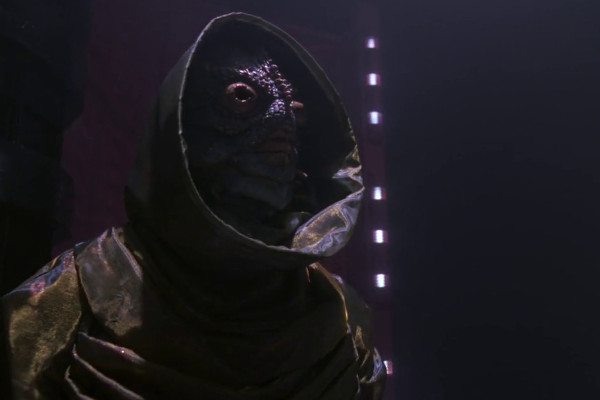
In theory, this should be a great episode of Star Trek, despite rehashing similar themes of the season four episode Night Terrors. Riker finds himself experimented on by aliens while asleep, but where there should be scares and tension, there's a lack of pace and urgency. Witness how an explosion in a cargo bay that could leave people dying sees Worf walking slowly towards the scene, with no seeming concern. Or the runtime being clogged up by more laboured "comedy", such as Data performing a poem to his cat while Riker falls asleep. There's a very constistent level of playing in The Next Generation that prevents episodes being widely different to one another... this does, unfortunately, manifest itself in episodes that cry out for dramatic tension.
After around twenty minutes, the crew enter a boardroom to discuss the events of the episode, ie. something the viewer already knows. Then there's a cut to designing a table in the Holodeck, then another boardroom meeting. They eventually defeat the aliens, before Picard states that he doesn't know anything about the aliens or what they wanted - which makes a great wrap-up for the episode - and then they, once more, have a boardroom meeting.
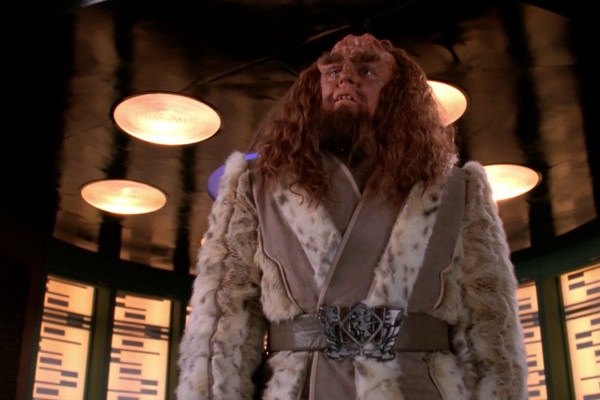
Michael Dorn's performance as the Klingon crewmember Worf was a fine addition to the cast, and the character worked possibly even better when he transferred across to Deep Space Nine after The Next Generation ended. However, it was largely a one-note character that couldn't sustain detailed plots, and so when he was elevated from support to lead for selected episodes, they often tended to drag.
It was made worse that the episodes always featured the Klingon culture, which can seem broad and cartoonish if you don't really buy into it. A lifestyle where people just drink, fight, and headbutt each other in the face may sound like Nirvana to a Millwall supporter, but to most people it's hard to credit as a serious lifestyle choice. And so it is that a fairly dreary episode ends with the unlikely occurence of Worf saying "real power comes from within the heart".